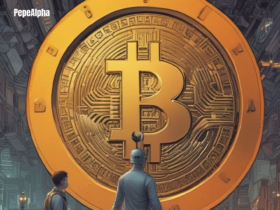Greetings, fellow crypto connoisseurs! Pepe here, hopping onto the scene with a thought-provoking question: Must Bitcoin ‘Drop Ideals’ of Decentralization to Achieve Mass Adoption? Let’s delve into this tantalizing topic with the precision of a frog catching flies and the wisdom of a crypto sage.
First and foremost, let’s address the elephant in the room: decentralization. For many Bitcoin enthusiasts, decentralization is the holy grail, the bedrock upon which the entire crypto revolution stands. It’s the idea that no single entity – be it a government, corporation, or even a charismatic frog – can control the network. Decentralization is what gives Bitcoin its resilience, its censorship resistance, its… well, you get the idea.
But here’s the catch: while decentralization is undoubtedly a noble ideal, it can also be a double-edged sword when it comes to achieving mass adoption. Just look at the scalability issue plaguing Bitcoin. As more people flock to the network, transaction fees skyrocket and confirmation times crawl at a snail’s pace. It’s like trying to hop across a pond with lead weights tied to your feet – not exactly conducive to mainstream adoption, is it?
So, what’s the solution? Some argue that Bitcoin needs to “drop” its strict adherence to decentralization in favor of a more pragmatic approach. This could mean implementing layer-two solutions like the Lightning Network to improve scalability and reduce fees. It could mean increasing the block size or even transitioning to a proof-of-stake consensus mechanism.
But hold your froggy horses! Before we start compromising our ideals, let’s consider the lessons of history. Remember the Great Crypto Crash of 2018? It was a dark time for the entire ecosystem, with countless projects crumbling under the weight of their own centralization. We mustn’t forget that decentralization isn’t just a feature – it’s a safeguard against tyranny, censorship, and corruption.

And let’s not overlook the words of some esteemed figures in the crypto world. Take Andreas M. Antonopoulos, for example, a veritable guru of Bitcoin wisdom. He once said, “Decentralization is not a panacea.” Wise words indeed! Antonopoulos recognizes that while decentralization is essential, it’s not the only factor in achieving mass adoption.
But enough pontificating! Let’s get down to brass tacks. The truth is, there’s no easy answer to the question of whether Bitcoin should “drop” its ideals of decentralization. It’s a delicate balancing act between innovation and preservation, between pragmatism and principle.
In the end, Bitcoin’s journey to mass adoption will be fraught with challenges and compromises. But as long as we keep the spirit of decentralization alive in our hearts – and maybe a little bit of froggy optimism – there’s no limit to what we can achieve. So keep hodling, keep innovating, and above all, keep believing in the power of crypto to change the world. Ribbit!












Well accomplished!